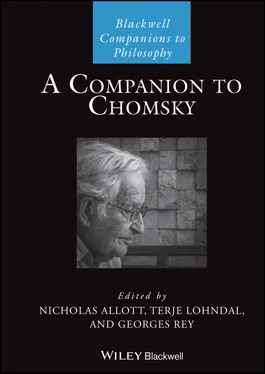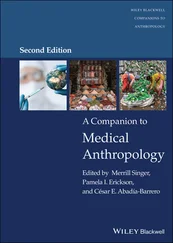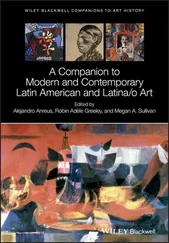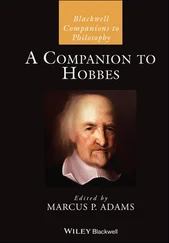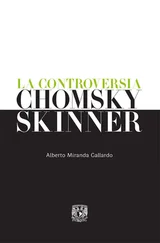A Companion to Chomsky
Здесь есть возможность читать онлайн «A Companion to Chomsky» — ознакомительный отрывок электронной книги совершенно бесплатно, а после прочтения отрывка купить полную версию. В некоторых случаях можно слушать аудио, скачать через торрент в формате fb2 и присутствует краткое содержание. Жанр: unrecognised, на английском языке. Описание произведения, (предисловие) а так же отзывы посетителей доступны на портале библиотеки ЛибКат.
- Название:A Companion to Chomsky
- Автор:
- Жанр:
- Год:неизвестен
- ISBN:нет данных
- Рейтинг книги:3 / 5. Голосов: 1
-
Избранное:Добавить в избранное
- Отзывы:
-
Ваша оценка:
- 60
- 1
- 2
- 3
- 4
- 5
A Companion to Chomsky: краткое содержание, описание и аннотация
Предлагаем к чтению аннотацию, описание, краткое содержание или предисловие (зависит от того, что написал сам автор книги «A Companion to Chomsky»). Если вы не нашли необходимую информацию о книге — напишите в комментариях, мы постараемся отыскать её.
Companion
Companion
A Companion to Chomsky
A Companion to Chomsky — читать онлайн ознакомительный отрывок
Ниже представлен текст книги, разбитый по страницам. Система сохранения места последней прочитанной страницы, позволяет с удобством читать онлайн бесплатно книгу «A Companion to Chomsky», без необходимости каждый раз заново искать на чём Вы остановились. Поставьте закладку, и сможете в любой момент перейти на страницу, на которой закончили чтение.
Интервал:
Закладка:
Here is an important detail. A verb will occur in several syntactic environments, some with varying numbers of arguments. So one can say, I gave a book to John , or I gave at the office, or I gave cash . But the maximal number of arguments semantically partitions the verb set in useful ways.
Of course this is complicated. But you know, infants aren't just infants; they're smart [laughter]. Right? So the relationship between number of arguments and number of NPs – there's something natural about it. And the same is true for the relation between sentence complementation and words like look and see , since we can perceive both objects and states of affairs. Therefore, just as in the original Great Verb Game, listener‐learners require several framing structures to retrieve the semantics of individual words.
[Mark: Is it fair to say that your syntactic bootstrapping theory is sort of a redemption of Zellig Harris's syntactic discovery procedures on the basis of transformational relations among sentence frames?] Right! Exactly. Because as a child, you don't get to hear underlying structures. You hear some form of a surface sentence. And you have to do something with it. So, yes, I think it's basically Zellig Harris rediscovered, redeemed, and put to purposes which he would hate [laughter].
But how else would you really understand Harris's theory? Here's how Harris expressed it: “You know, you really put together a grammar by intuition. But to have a theory you have to show that it could be mechanically invented.” You have to show that you could have done it algorithmically. A machine could have invented it. That was his story. And that machine which could have invented it is the theory of language.
Well, I believe that too, but I believe that's the language acquisition device, fondly referred to as Universal Grammar.
{The following Sections from original article have been omitted here:
sec 5. TAKING THE THEORY INTO THE LABORATORY
sec 6. THE HUMAN SIMULATION PARADIGM
sec 7. EASY WORDS: FIRST STEPS IN ACQUIRING THE LEXICON
sec 8. CONCEPTS
sec 9. WHORF: DO CONCEPTS COME FROM LANGUAGE ITSELF?}
7.10 Thoughts about the Future
After this long odyssey about our studies in language acquisition, let me return to Chomsky's early proposal concerning “the poverty of the stimulus” (the series of insights about the “stimulus‐free” nature of language learning and use). Most generally, Chomsky has invited us to consider the human Mind in light of the fact that every normal child acquires any known natural language to an expert level in a relatively brief period of time in infancy and early childhood, based on the hearing (or gesturing, in the case of sign language) an adventitious set of sentences in context.
In contrast, behaviorist psychology saw language learning as an instance of more general principles of operant conditioning, a relatively straightforward distillation and organization of experience. But the models presented, as Chomsky argued, never offered a plausible account of the dimensions of structured generalization.
Classical AI raised an analogous argument by analyzing intelligence as applied logic. But logic and formal language theory left language open to massive and pervasive ambiguity, even if the “grammar” could be learned perfectly. So the next generation re‐interpreted intelligence as applied probability. This worked much better, except when it didn't.
Useful examples come from the so‐called Winograd Schema Challenge (Morgenstern et al., 2016). Consider the following sentences:
The town councillors refused to give the angry demonstrators a permit because they feared violence .
Who feared violence?
Answer 1: the town councillors
Answer 2: the angry demonstrators
Here the special word is “feared” and its alternate is “advocated” as in the following:
The town councillors refused to give the angry demonstrators a permit because they advocated violence .
Who advocated violence?
Any average 10‐year‐old can resolve these ambiguities flawlessly. But after years and years of machine modeling, these devices still go 50–50 on the chosen resolutions. Even the newer “deep learning” networks, which require exponentially more training data than humans do, learn things that humans would never consider and lack the ability to integrate common‐sense reasoning.
Perhaps the core problem for the machine learner is that he never gets the joke. He mulishly acquires what is most probable and is stymied by the improbabilities of everyday life. Instructive for this problem are several newspaper headlines collected by Steven Pinker and republished in his {(1994/2007)} book The Language Instinct . One example is “Queen Mary has bottom scraped,” which makes every listener chuckle, but the machines have no useful chuckle routines. Another example from Pinker was the headline, “Man gets six months in violin case.” True, humans and not machines know how this choice should “usually” be made and therefore giggle, and so opt for the interpretation of “case” as litigation rather than container. But now consider the recent escape of the billionaire Carlos Ghosn from the Japanese legal system, which was accomplished indeed by his secreting himself inside a violin case (a double bass case, but who's counting). The point is that we humans can understand the probabilities in the world so as to interpret ambiguity and take this into account, but when the improbable becomes the actual, we continue to understand.
These are the kinds of formal and substantive properties of language and thought that Chomsky has invited us to consider from the earliest to most recent of his writings. So extravagant did these claims seem at the time when I first read them that they set the stage for my life's work in fleshing out details with experiments relevant to this topic, namely, that is, how radically could experience differ and still support language learning. This is why we considered the deprivation of experience in the blind and isolated deaf.
Chomsky continues to frame and expatiate upon the central questions of language learning and knowledge, and I stand very much in his debt.
7.11 Conclusion
In many ways, I think of my lines of work as (partly inadvertent, partly adventitious) elaborations of several of the approaches to language and mind that Chomsky and [Jerry] Fodor brought into the study of language, thus creating a more general revolution in how cognitive science thinks about the nature of mind. The most general conclusion pertains to how much and how widely knowledge is a function of the structure of mind, and how restricted the influence of experience is. This is why the many studies of acquisition in infants with deprivation of input showed so little effect on the final product.
At the same time, there is much to be said in support of Zellig Harris's perspective, which looks so different on the surface. After all, Harris held, and so did Plato, that the knowledge we had at birth is forgotten. I interpret this to mean that although we are surely endowed with a language capacity, we forget, or never knew, how it is instantiated in English in particular. For the latter, we have to observe and integrate the evidence that is provided in the surface forms of the exposure language.
If I had to summarize the odyssey that this succession of studies chronicles, the two‐line conclusion might be: Language acquisition is obviously impossible, but somehow they do it. Empiricism is innate, but somehow we get over it.
At peril of going on forever here, I do want to say a few more words about how this enterprise unfolded, for it was certainly a product of “groupthink.” Henry Gleitman (ultimately the teacher of all of us collaborators) started a research seminar in which we all continued to talk for almost half a century. After a while, it came to be called “the cheese seminar,” because of the refreshments provided halfway through these long evenings of talk, and then, with the addition of insights and methods from Trueswell's students joining this larger group, “the cheese and trackers seminar” – not only cheese and not only eye‐tracking. It was decades of cross talk and collaboration, continuing to this very day, for a great circle of young scientists, some of whom I've mentioned in sketching the styles of investigation and explanation that emerged from this group. And I'm glad to say that I'm more than proud, that this seminar continues: I am particularly proud to say that in the present incarnation of this kind of research seminar, now led by Trueswell, my very first postdoc and early collaborator, Sharon Armstrong (professor of psychology at LaSalle University), continues to attend and to contribute to the next generation of this half‐century‐long conversation.
Читать дальшеИнтервал:
Закладка:
Похожие книги на «A Companion to Chomsky»
Представляем Вашему вниманию похожие книги на «A Companion to Chomsky» списком для выбора. Мы отобрали схожую по названию и смыслу литературу в надежде предоставить читателям больше вариантов отыскать новые, интересные, ещё непрочитанные произведения.
Обсуждение, отзывы о книге «A Companion to Chomsky» и просто собственные мнения читателей. Оставьте ваши комментарии, напишите, что Вы думаете о произведении, его смысле или главных героях. Укажите что конкретно понравилось, а что нет, и почему Вы так считаете.
